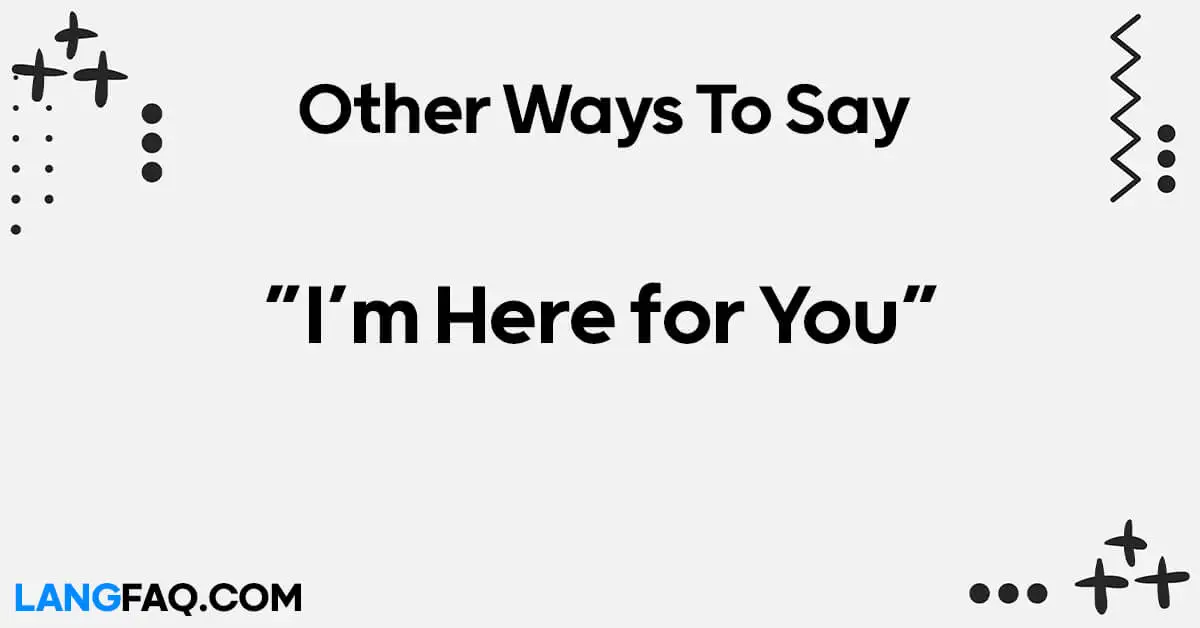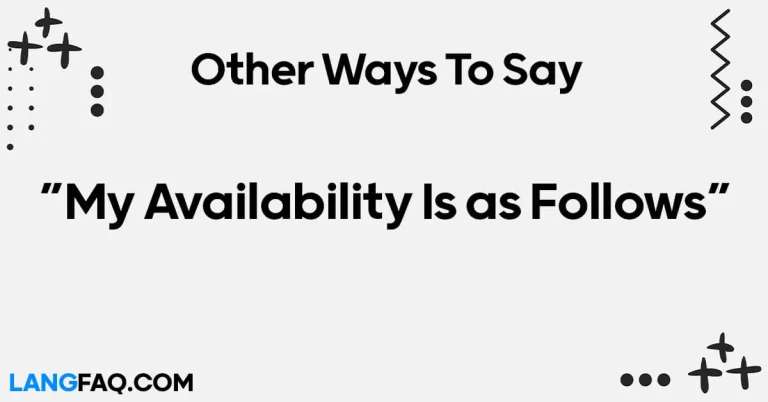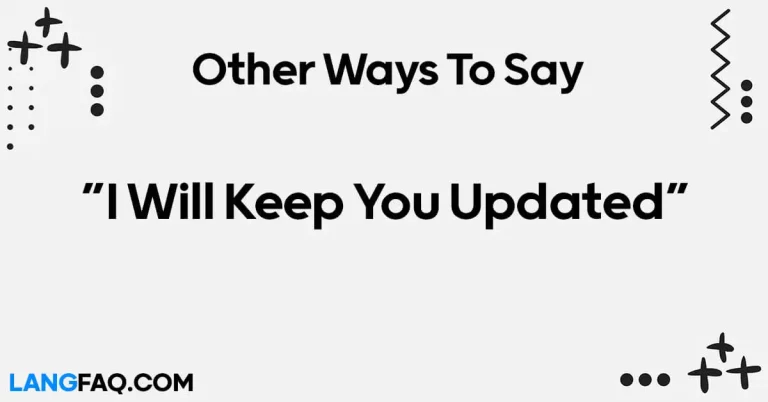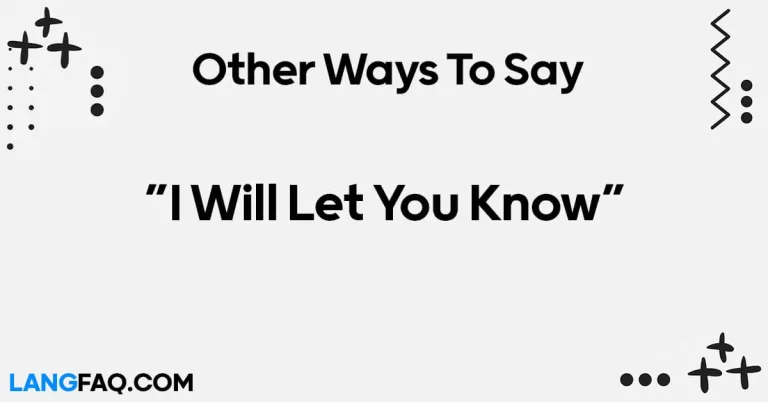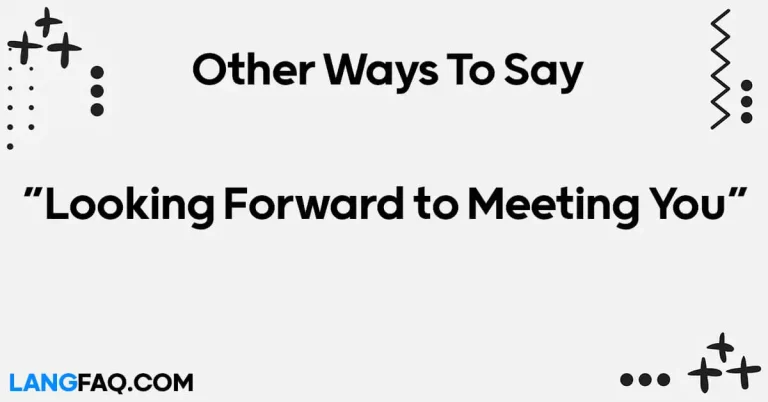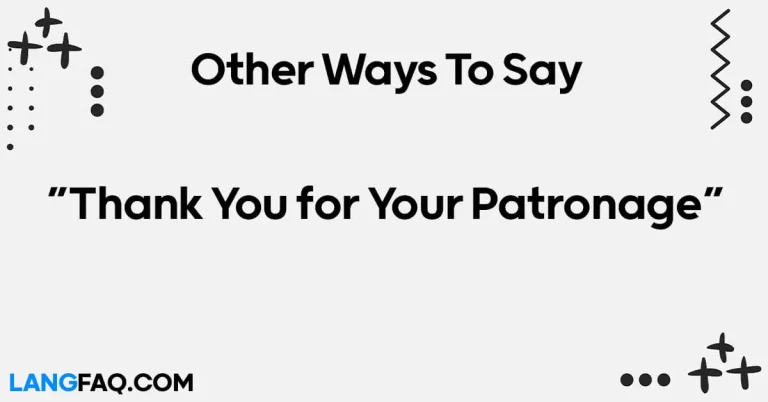In a world where expressing empathy and support is essential, finding new ways to say “I’m here for you” can make a significant difference in your relationships and interactions.
Whether you want to comfort a friend, console a family member, or offer your support to a colleague, having a repertoire of phrases at your disposal can help you convey your feelings more effectively.
In this article, we’ll explore 14 other ways to say “I’m here for you,” providing you with valuable insights and options for expressing your support.
The Importance of Empathy
Before we delve into alternative phrases, let’s discuss the importance of empathy in our daily lives. Empathy is the ability to understand and share the feelings of others. It’s a crucial element of effective communication and building meaningful connections with people.
Empathy enables us to connect with others on a deeper level, offering comfort and reassurance during challenging times. When we say “I’m here for you” or its alternatives, we show our willingness to be emotionally present and provide the support others need.
14 Other Ways to Say “I’m Here for You”
Here are 14 other ways to say “I’m here for you,” each with its unique nuance:
- “I’ve Got Your Back”
- “You Can Count on Me”
- “I’m Here to Help”
- “Lean on Me”
- “I’m at Your Service”
- “You’re Not Alone”
- “I’m All Ears”
- “I’m Here to Support You”
- “Count Me In”
- “You’ve Got a Friend in Me”
- “How Can I Assist You?”
- “I’m by Your Side”
- “I’m Here Whenever You Need Me”
- “You’re in Good Hands”
These alternative phrases offer various ways to express your support and empathy, allowing you to choose the one that best suits the situation and your relationship with the person you want to comfort or assist.
1. “I’ve Got Your Back”
Understanding the Phrase
“I’ve got your back” is an idiomatic expression that conveys unwavering support and protection. When you use this phrase, you’re essentially telling someone that you’re willing to stand up for them, offer assistance, and watch out for their well-being.
When to Use It
This phrase is commonly used in situations where you want to assure someone that you’ll be there to support them, no matter the challenges they face. It’s often used among friends, family members, and colleagues to offer comfort and reassurance.
Tips and Usage
- Use it in informal settings to make your support sound more genuine and friendly.
- Example: “Don’t worry about the presentation tomorrow; I’ve got your back if you need any help.”
2. “You Can Count on Me”
Understanding the Phrase
“You can count on me” is a straightforward and reassuring phrase. It implies reliability and trustworthiness, indicating that the person can depend on you for assistance, guidance, or any form of support.
When to Use It
This phrase is suitable for both personal and professional contexts. It’s especially effective when you want to offer your support in a dependable and trustworthy manner.
Tips and Usage
- Use it when making commitments or promises to someone.
- Example: “If you ever need help with the project, remember, you can count on me to be there.”
3. “I’m Here to Help”
Understanding the Phrase
“I’m here to help” is a direct and clear way to express your willingness to provide practical assistance. It leaves no room for ambiguity and demonstrates your readiness to be of service.
When to Use It
This phrase is versatile and can be used in various situations, whether you’re offering assistance at work, volunteering to help a friend move, or supporting someone during a challenging time.
Tips and Usage
- Use it when you want to proactively offer your assistance.
- Example: “Let me know if you need anything; I’m here to help in any way I can.”
4. “Lean on Me”
Understanding the Phrase
“Lean on me” is a figurative way of saying that you’re willing to be a source of strength and stability for someone in need. It implies that they can rely on you for emotional support.
When to Use It
This phrase is often used when you want to convey that you’re available to provide comfort and be a shoulder to lean on during challenging times.
Tips and Usage
- Use it when you want to emphasize your emotional support.
- Example: “You don’t have to go through this alone; you can lean on me for support.”
5. “I’m at Your Service”
Understanding the Phrase
“I’m at your service” is a formal way of expressing your availability and eagerness to assist someone. It’s commonly used in professional settings but can also be used in personal contexts.
When to Use It
This phrase is suitable when you want to offer help in a polite and respectful manner. It implies a sense of duty and a commitment to providing assistance.
Tips and Usage
- Use it when you want to offer your assistance in a professional or courteous manner.
- Example: “If you have any questions or need assistance, please feel free to ask; I’m at your service.”
These are just a few alternative phrases to express your support. Each phrase carries its unique nuances, allowing you to convey your empathy effectively in different situations. In the next part of this blog post, we’ll explore more phrases and their usage, helping you expand your repertoire of supportive expressions.
6. “You’re Not Alone”
Understanding the Phrase
“You’re not alone” is a reassuring phrase that emphasizes solidarity and companionship. When you say this, you’re letting someone know that you’re there for them, standing beside them through their challenges.
When to Use It
This phrase is particularly powerful during moments when someone might be feeling isolated or going through a difficult time. It reminds them that they have your emotional support and that they don’t have to face their struggles in solitude.
Tips and Usage
- Use it when you want to provide comfort and reassurance.
- Example: “I know things are tough right now, but remember, you’re not alone in this journey.”
7. “I’m All Ears”
Understanding the Phrase
“I’m all ears” is a colloquial way of expressing your willingness to listen attentively. It signifies that you’re ready to lend a sympathetic ear to someone who wants to talk or share their thoughts.
When to Use It
This phrase is ideal when you want to show that you’re open to listening and that you value the other person’s feelings and perspective.
Tips and Usage
- Use it to encourage someone to speak freely.
- Example: “Whenever you’re ready to talk, I’m all ears and here to listen.”
8. “I’m Here to Support You”
Understanding the Phrase
“I’m here to support you” is a straightforward declaration of your intention. It clearly states that you are committed to assisting and helping someone through their challenges.
When to Use It
This phrase is suitable when you want to express your support in a sincere and unambiguous manner. It leaves no doubt about your willingness to be there for them.
Tips and Usage
- Use it when you want to emphasize your commitment to their well-being.
- Example: “No matter what you’re going through, please know that I’m here to support you every step of the way.”
9. “Count Me In”
Understanding the Phrase
“Count me in” is an enthusiastic way to express your willingness to participate and be involved in someone’s plans or endeavors. It signifies your readiness to join them in whatever they are doing.
When to Use It
This phrase is versatile and can be used in both casual and formal contexts. It’s effective when you want to show your enthusiasm for joining or assisting with an activity.
Tips and Usage
- Use it when you want to demonstrate your eagerness to be part of something.
- Example: “Planning a hiking trip this weekend? Count me in; I’d love to join!”
10. “You’ve Got a Friend in Me”
Understanding the Phrase
“You’ve got a friend in me” is a phrase that conveys enduring friendship and a steadfast presence. It assures the person that they can rely on your friendship and support.
When to Use It
This phrase is perfect for reinforcing your friendship and reminding someone that you’re there for them, no matter what.
Tips and Usage
- Use it to emphasize the strength of your friendship.
- Example: “Through thick and thin, remember, you’ve got a friend in me.”
These phrases offer unique ways to express your support, and understanding their nuances can help you choose the most appropriate one for various situations. In the next part of this educational blog post, we will continue exploring more alternatives to “I’m here for you,” providing you with a comprehensive toolkit for effective communication and support. Stay tuned for additional phrases and their usage tips.
11. “How Can I Assist You?”
Understanding the Phrase
“How can I assist you?” is a polite and considerate way to offer help tailored to someone’s specific needs. It demonstrates your eagerness to provide assistance in a way that aligns with their preferences.
When to Use It
This phrase is suitable for various situations, particularly in professional settings or when you want to make sure your help is tailored to the person’s requirements.
Tips and Usage
- Use it when you want to show that you respect the person’s autonomy and preferences.
- Example: “If there’s anything I can do to assist you with the project, please let me know. How can I assist you?”
12. “I’m by Your Side”
Understanding the Phrase
“I’m by your side” emphasizes your presence and companionship during difficult times. It conveys the message that you’re there to provide emotional support and comfort.
When to Use It
This phrase is especially effective when you want to assure someone that you’ll be there for them, offering your emotional support and solidarity.
Tips and Usage
- Use it when you want to emphasize your physical or emotional presence.
- Example: “No matter what happens, remember that I’m by your side, and we’ll face this together.”
13. “I’m Here Whenever You Need Me”
Understanding the Phrase
“I’m here whenever you need me” communicates your constant availability and support. It reassures the person that you’re ready to assist them at any time.
When to Use It
This phrase is ideal for expressing your unwavering commitment to being there for someone, regardless of when they may require your support.
Tips and Usage
- Use it when you want to convey your round-the-clock availability.
- Example: “Feel free to reach out anytime you need assistance or just someone to talk to. I’m here whenever you need me.”
14. “You’re in Good Hands”
Understanding the Phrase
“You’re in good hands” implies that the person can trust you to take care of their needs and concerns. It conveys a sense of security and confidence in your ability to assist them effectively.
When to Use It
This phrase is often used in situations where someone might be worried or anxious about a particular matter. It offers reassurance and comfort.
Tips and Usage
- Use it when you want to instill confidence in the person.
- Example: “Don’t worry about the project; you’re in good hands, and we’ll handle it together.”
Expanding your repertoire of alternative phrases to say “I’m here for you” not only enhances your communication skills but also strengthens your ability to provide support and comfort in various situations. Remember that the choice of phrase should align with the context and the person’s emotional state, making your support more meaningful and effective.
In the upcoming sections of this educational blog post, we will explore more ways to express support and empathy, equipping you with a comprehensive toolkit for effective communication and connection. Stay tuned for further insights and practical tips to improve your interpersonal relationships.
FAQs
What’s the significance of expressing support differently?
Expressing support differently allows you to convey your empathy more effectively and adapt to the recipient’s emotional state and preferences. It shows that you care deeply about their well-being.
Can I use these phrases in professional settings?
Absolutely. These phrases can be used both in personal and professional contexts to express your support and empathy.
How can I choose the right phrase?
Consider the recipient’s personality, the context, and your relationship with them. Choose a phrase that feels genuine and appropriate for the situation.
Are there cultural considerations for using these phrases?
Yes, some phrases may be more culturally specific. It’s essential to be aware of cultural nuances and use phrases that are respectful and appropriate.
Should I use these phrases in writing or speaking?
Both! These phrases can be used effectively in written messages, conversations, and face-to-face interactions.
How can I improve my overall empathy?
Practice active listening, be present in the moment, and show genuine interest in others’ feelings and experiences. Empathy grows with practice and intention.
Conclusion
In conclusion, showing support and empathy is a fundamental aspect of building meaningful connections with others. By exploring these 14 alternative ways to say “I’m here for you,” you can enhance your communication skills and demonstrate your commitment to being there for the people in your life. Remember, empathy is a powerful tool that can make a positive impact on the lives of those around you.

